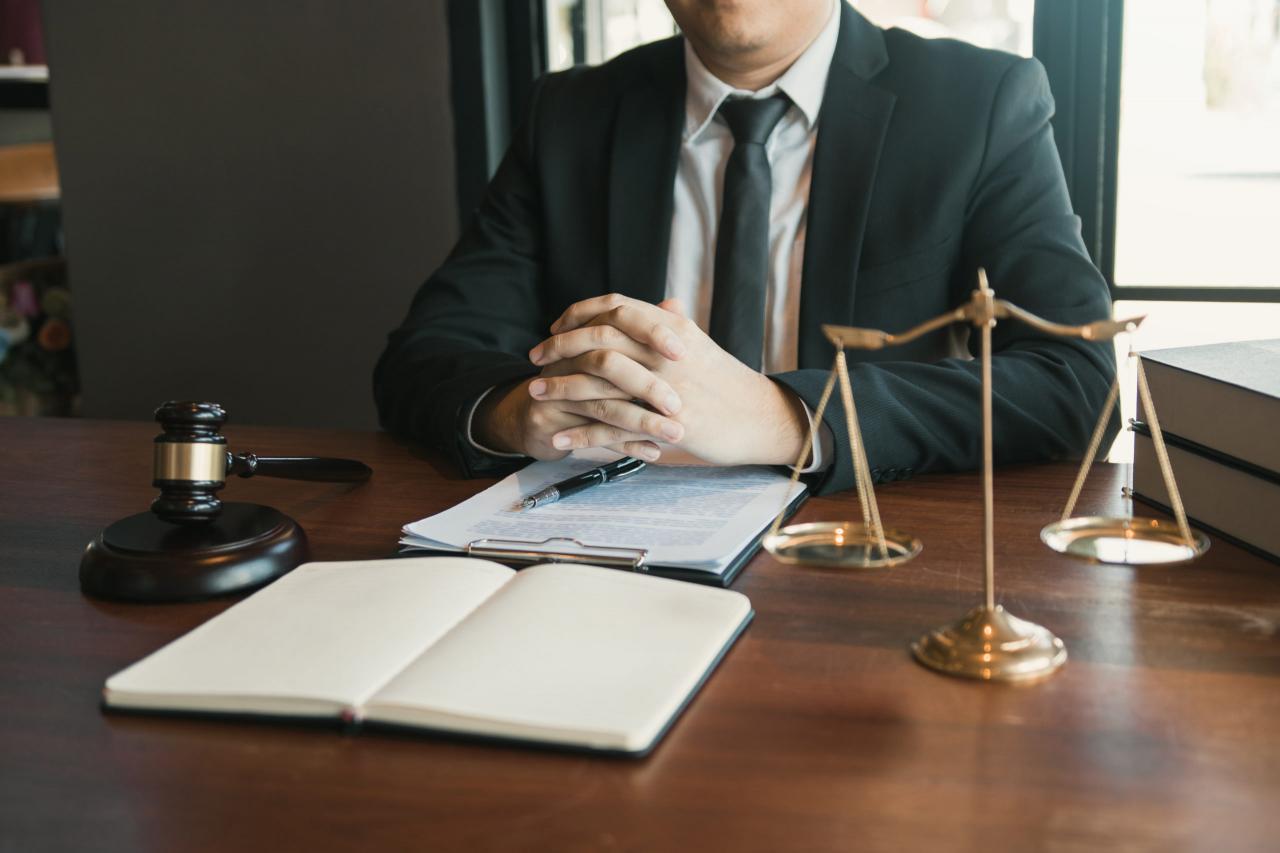How to find a good lawyer for a personal injury case? It’s a question that echoes through the minds of countless individuals facing unexpected hardship. Navigating the legal labyrinth after an accident can feel overwhelming, but finding the right advocate can make all the difference. This guide cuts through the confusion, offering a practical roadmap to securing expert legal representation and fighting for the compensation you deserve.
We’ll unravel the complexities, empowering you to make informed decisions every step of the way.
From understanding the nuances of different personal injury cases to mastering the art of lawyer selection, we’ll equip you with the knowledge and strategies to confidently navigate this crucial process. We’ll delve into crucial aspects like evaluating lawyer credentials, deciphering fee structures, and understanding the legal process itself. Prepare to become a savvy legal consumer, ready to take control of your future.
Understanding Your Needs
Finding the right lawyer for your personal injury case begins with a clear understanding of your situation. Knowing the type of injury, the extent of your damages, and the evidence you possess is crucial in selecting a lawyer with the appropriate skills and experience. Failing to properly assess your needs can lead to choosing a lawyer who isn’t the best fit, potentially jeopardizing your case.Different types of personal injury cases require specialized expertise.
A lawyer experienced in car accidents might not be the best choice for a medical malpractice case, for instance. Understanding these distinctions is vital for maximizing your chances of a successful outcome.
Finding a good lawyer for your personal injury case means thorough research; check reviews and experience. Just like choosing the right protection for your adventures, selecting legal representation requires careful consideration. Knowing how to choose the right travel insurance for backpacking trips, how to choose the right travel insurance for backpacking trips , is similar in its need for due diligence; ensure your lawyer’s expertise aligns with your case’s specifics for the best outcome.
Types of Personal Injury Cases and Required Expertise
Personal injury cases encompass a broad spectrum of situations. Some common types include car accidents, slip and falls, medical malpractice, product liability, and workplace injuries. Each type demands a unique set of legal skills and knowledge. For example, a car accident case might involve investigating police reports, witness statements, and vehicle damage, while a medical malpractice case requires a deep understanding of medical procedures and standards of care.
Similarly, product liability cases focus on proving manufacturer negligence, requiring expertise in product design and safety regulations. Choosing a lawyer specializing in your specific type of injury significantly increases your chances of a favorable outcome.
Factors Determining Case Severity and Potential Value
Several factors contribute to the severity and potential value of your personal injury case. The most significant is the extent of your injuries. Severe injuries, such as traumatic brain injuries or spinal cord damage, will naturally lead to higher damages compared to minor injuries like bruises or sprains. The amount of medical expenses incurred, lost wages, and pain and suffering also play a crucial role in determining the case’s value.
For example, a case involving extensive medical treatment, prolonged rehabilitation, and significant lost income will likely have a higher settlement value than a case with minimal medical costs and short-term lost wages. Consider a case where someone suffered a broken leg in a car accident, requiring surgery and months of physical therapy, versus someone with only minor scrapes.
The former will clearly have a much higher potential value.
Gathering and Organizing Case Documentation
Thoroughly documenting your case from the outset is essential. This involves gathering all relevant medical records, including doctor’s notes, test results, and bills. Police reports, witness statements, photographs of the accident scene, and any communication with the at-fault party should also be collected. Keeping a detailed personal journal documenting your injuries, pain levels, and limitations in daily activities can also be valuable.
Organize these documents chronologically and systematically to ensure easy access for your lawyer. A well-organized collection of evidence significantly strengthens your case and demonstrates your commitment to pursuing justice. Imagine a case with meticulously documented medical bills and therapy records versus one with only fragmented information. The former will undoubtedly present a stronger argument.
Finding Potential Lawyers
Finding the right personal injury lawyer can feel overwhelming, but with a systematic approach, you can significantly narrow down your options and identify those best suited to your case. This section Artikels effective strategies for locating and vetting potential legal representatives. Remember, choosing the right lawyer is a crucial step in protecting your rights and securing a favorable outcome.
Online legal directories offer a convenient starting point in your search for a personal injury lawyer. These platforms compile lawyer profiles, allowing you to filter based on specific criteria and compare different options. Effective use of these resources is key to efficiently finding suitable candidates.
Using Online Legal Directories
Effectively utilizing online legal directories requires a strategic approach. Begin by identifying reputable directories with extensive listings and user reviews. Many bar associations maintain their own directories, offering a degree of verification. Once you’ve selected a directory, use its search filters to refine your results. Look for options to filter by location (city, state, or zip code), legal specialization (personal injury, medical malpractice, etc.), and even specific areas within personal injury law (e.g., car accidents, slip and falls).
This targeted approach saves time and ensures you only review profiles relevant to your needs. Pay close attention to lawyer profiles, noting their experience, case successes, and client testimonials.
Searching Based on Location, Specialization, and Client Reviews
Location is a critical factor; you’ll want a lawyer who is conveniently located and familiar with the local courts and legal landscape. Specialization is equally important; a lawyer specializing in personal injury law will possess the necessary expertise and experience to handle your case effectively. Client reviews offer invaluable insight into a lawyer’s communication style, responsiveness, and overall effectiveness.
Look for consistent positive feedback across multiple platforms. Be wary of profiles with overwhelmingly positive reviews, as these might be artificially inflated. A balanced range of reviews, highlighting both strengths and areas for improvement, often provides a more realistic picture.
Checking Lawyer Credentials and Disciplinary Records, How to find a good lawyer for a personal injury case
Verifying a lawyer’s credentials and disciplinary record is a non-negotiable step in the selection process. You can usually find this information through the state bar association’s website. Each state’s bar association maintains a public database detailing lawyer licenses, disciplinary actions, and any complaints filed against them. Reviewing this information allows you to identify any potential red flags and choose a lawyer with a clean record and proven competence.
Don’t hesitate to contact the bar association directly if you have any questions or require clarification on a lawyer’s record. This due diligence protects you from engaging a lawyer with a history of misconduct or incompetence.
Initial Consultation & Evaluation

The initial consultation is your chance to assess the lawyer and determine if they’re the right fit for your case. This meeting isn’t just about them evaluating your case; it’s equally aboutyou* evaluating them. A successful outcome hinges not only on legal expertise but also on a strong attorney-client relationship built on trust and effective communication.This crucial first meeting allows you to delve into the specifics of your case, understand the lawyer’s approach, and gauge their ability to represent your best interests.
Don’t hesitate to ask pointed questions and thoroughly explore all aspects of their services. Remember, you’re hiring them, so make sure you feel comfortable and confident in their abilities.
Questions to Ask During an Initial Consultation
Before your consultation, prepare a list of questions to ensure you cover all essential aspects. This proactive approach will help you make an informed decision. A well-prepared client is a powerful client.
Navigating the legal system after a personal injury can be daunting, so choosing the right lawyer is crucial. Thorough research, including checking online reviews and referrals, is key. However, planning for the future is equally important; consider exploring options like learning how to find affordable long term care insurance options for seniors to secure your financial well-being later in life.
This proactive approach complements securing strong legal representation for immediate needs.
- Inquire about the lawyer’s experience handling similar personal injury cases, including the specific types of injuries and the outcomes achieved.
- Ask about their strategy for your particular case, including their approach to investigation, negotiation, and litigation if necessary.
- Clarify their understanding of the complexities of your case and their ability to address any unique challenges involved.
- Request information about their communication practices, including how often you can expect updates and the methods they use (e.g., email, phone calls).
- Ask about their support staff and the resources available to assist with your case.
Understanding Lawyer Fee Structures and Payment Options
Understanding how a lawyer charges for their services is paramount. Transparency in fees is crucial for managing expectations and avoiding financial surprises down the line. Different lawyers employ various fee structures, and it’s vital to fully grasp these details before proceeding.Many personal injury lawyers work on a contingency fee basis. This means they only get paid if they win your case, and their fee is a percentage of the settlement or judgment awarded.
However, it’s important to understand the exact percentage, whether there are any additional costs (like court filing fees), and what happens if the case is lost. Some lawyers may also charge hourly rates, particularly for specific tasks or if the case isn’t suitable for a contingency fee agreement. Always obtain a detailed breakdown of all potential costs.
For example, a lawyer might charge 33% of the settlement if the case is settled before trial but 40% if it goes to trial. Knowing this distinction beforehand is vital.
Evaluating the Lawyer’s Communication Style and Responsiveness
Effective communication is the bedrock of a successful attorney-client relationship. You need a lawyer who listens attentively, clearly explains complex legal concepts in a way you understand, and responds promptly to your inquiries.Consider the lawyer’s demeanor during the consultation. Do they actively listen to your concerns? Do they answer your questions thoroughly and patiently? A lawyer who is dismissive or unresponsive during the initial consultation is unlikely to improve in these areas later on.
Prompt and clear communication ensures you stay informed about the progress of your case, reducing anxiety and allowing for collaborative decision-making. For instance, a lawyer who consistently takes days to respond to emails might not be the best choice if you need regular updates.
Comparing Lawyer Qualifications & Experience
Choosing the right personal injury lawyer is crucial for a successful outcome. A thorough comparison of their qualifications and experience is paramount, going beyond simply looking at their website or advertisements. This involves a detailed examination of their track record, expertise, and client feedback.
Understanding a lawyer’s qualifications and experience requires a multi-faceted approach. Don’t just focus on years in practice; delve into the types of cases they’ve handled, their success rates, and the strategies they employ. Client testimonials offer invaluable insights into their communication style, responsiveness, and overall client experience.
Lawyer Qualification and Experience Comparison
The following table helps illustrate the key aspects to compare when assessing potential lawyers for your personal injury case. Remember, these are examples and actual figures will vary significantly.
| Lawyer Name | Years of Experience | Case Success Rate (Approximate) | Specialization | Client Testimonials Summary |
|---|---|---|---|---|
| Jane Doe, Esq. | 15 | 85% | Car Accidents, Motorcycle Accidents | Positive feedback regarding communication and aggressive representation. Some clients mentioned longer-than-expected case resolution times. |
| John Smith, Esq. | 20 | 90% | Medical Malpractice, Product Liability | Clients praise his expertise and thoroughness. Comments suggest a formal and less personable approach. |
| Sarah Lee, Esq. | 5 | 75% | Slip and Fall Accidents, Premises Liability | Positive reviews highlight her responsiveness and accessibility. Some clients noted her relative inexperience in complex cases. |
| David Brown, Esq. | 10 | 80% | Wrongful Death, Construction Accidents | Clients appreciate his compassionate approach and strong advocacy. A few comments mention a higher-than-average fee structure. |
Reviewing Past Case Results and Client Testimonials
Reviewing past case results and client testimonials provides a crucial window into a lawyer’s capabilities and work ethic. Past case results demonstrate their ability to achieve favorable outcomes for their clients, showcasing their legal strategies and negotiation skills. For example, examining case summaries can reveal the complexity of cases handled, the types of settlements achieved, and the overall success rate in similar cases to yours.
This allows for a more informed decision.
Client testimonials offer a less formal, yet equally valuable, perspective. They provide insights into the lawyer’s communication style, responsiveness, and overall client experience. Positive feedback on communication, responsiveness, and accessibility indicates a lawyer who prioritizes client needs and keeps them informed throughout the legal process. Negative feedback, while less desirable, can highlight potential areas of concern, such as poor communication or lack of responsiveness.
Comparison of Legal Strategies in Personal Injury Cases
Different lawyers may employ different legal strategies, depending on the specifics of the case. Some may focus on aggressive negotiation and settlement, while others may prefer litigation. For instance, one lawyer might prioritize a quick settlement to minimize costs and time, while another might pursue a more protracted legal battle to maximize compensation. The choice of strategy depends on various factors, including the strength of the case, the client’s goals, and the lawyer’s experience and resources.
Understanding the different legal strategies and their potential implications is crucial in selecting the right lawyer. For example, a lawyer specializing in aggressive negotiation might be ideal for straightforward cases with clear liability, while a litigator might be better suited for complex cases requiring extensive legal arguments and court proceedings. Ultimately, the best legal strategy is one that aligns with your individual needs and goals.
Choosing the Right Lawyer

Selecting the right personal injury lawyer is a crucial step in protecting your rights and securing the compensation you deserve. This decision shouldn’t be taken lightly, as your lawyer will be your advocate throughout a potentially lengthy and complex legal process. Consider this final choice carefully, weighing all the factors discussed previously to ensure a strong partnership.After careful consideration of several candidates, you’ll need to assess which lawyer best aligns with your specific needs and offers the most promising path to a successful outcome.
This involves not only evaluating their expertise but also considering their communication style, fees, and overall compatibility.
Factors Influencing the Final Decision
Several key factors should guide your final decision. These include the lawyer’s communication style – do you feel comfortable communicating with them? Are they responsive to your inquiries? Another vital factor is the lawyer’s fee structure; understand clearly how they charge and whether it aligns with your budget and expectations. Finally, consider the overall feeling you get from the lawyer; do you trust their judgment and believe they will diligently fight for your interests?
A strong attorney-client relationship built on trust and open communication is essential for a successful case.
Retaining a Lawyer and Signing a Legal Agreement
Formally retaining a lawyer involves signing a retainer agreement. This legally binding contract Artikels the terms of your representation, including the scope of work, fees, payment schedule, and the responsibilities of both parties. Carefully review this agreement before signing; don’t hesitate to ask questions if anything is unclear. The agreement typically specifies the lawyer’s fees (hourly rate, contingency fee, or a combination), expenses, and payment terms.
It should also detail the process for terminating the agreement should the need arise. A well-drafted retainer agreement protects both you and your lawyer, ensuring a clear understanding of the working relationship.
Addressing Dissatisfaction with Your Chosen Lawyer
Even after careful selection, you might find yourself dissatisfied with your lawyer’s performance. If this happens, you have options. First, attempt open communication. Schedule a meeting to discuss your concerns directly. Clearly articulate your dissatisfaction and what needs to be improved.
If communication fails to resolve the issues, you may need to consider switching lawyers. This often involves formally terminating the retainer agreement, following the procedures Artikeld within that document. Finding a new lawyer may require repeating some of the initial steps of the process, but it’s crucial to prioritize finding an attorney who can effectively represent your interests.
Remember to gather all relevant documents from your previous lawyer before switching.
Understanding the Legal Process: How To Find A Good Lawyer For A Personal Injury Case

Navigating a personal injury lawsuit can feel overwhelming, but understanding the typical stages involved can ease anxieties and help you manage expectations. The process is rarely straightforward and timelines are often fluid, influenced by various factors including the complexity of the case, the insurance company’s response, and even court scheduling.The legal process in personal injury cases generally unfolds in several key phases.
Each phase requires careful planning, diligent preparation, and consistent communication with your lawyer. While the specific details may vary depending on your jurisdiction and the specifics of your case, a general understanding of these stages will equip you to better participate in the process.
Stages of a Personal Injury Lawsuit
The journey from accident to settlement or verdict typically involves several distinct stages. These stages can overlap, and their duration varies considerably. A clear understanding of each stage helps manage expectations and prepare for potential challenges.
- Investigation and Claim Filing: This initial phase focuses on gathering evidence, including medical records, police reports, witness statements, and photos of the accident scene. Your lawyer will investigate the circumstances of the accident to determine liability and assess the extent of your injuries. This stage usually takes several weeks to a few months, depending on the complexity of the case and the cooperation of involved parties.
For example, obtaining complete medical records can be a time-consuming process, particularly if multiple specialists are involved.
- Demand Letter and Negotiation: Once sufficient evidence is gathered, your lawyer will send a demand letter to the at-fault party’s insurance company outlining your claim and seeking a settlement. Negotiations then begin, with both sides exchanging information and offers. This stage can last from a few months to over a year, depending on the insurance company’s responsiveness and the complexity of the negotiations.
A case involving significant injuries and high damages will naturally take longer to negotiate.
- Filing a Lawsuit: If negotiations fail to reach a satisfactory settlement, your lawyer will file a lawsuit in court. This initiates the formal legal process, and the defendant (the at-fault party) will be required to respond. This stage involves preparing and filing the necessary paperwork, and it typically takes a few weeks to a couple of months.
- Discovery: This phase involves the exchange of information between both sides. This includes depositions (sworn testimony), interrogatories (written questions), requests for documents, and other discovery methods aimed at gathering evidence and clarifying the facts of the case. This is often the longest stage, potentially lasting several months to even a couple of years. Complex cases with multiple parties and extensive documentation can significantly extend this phase.
- Trial Preparation: If the case isn’t settled during discovery, both sides prepare for trial. This involves reviewing evidence, preparing witnesses, and strategizing trial tactics. This stage can take several months, depending on the complexity of the case and the court’s schedule.
- Trial (if necessary): Not all personal injury cases go to trial. Many are settled before trial. However, if a settlement cannot be reached, the case will proceed to trial. The trial itself can last from a few days to several weeks, depending on the complexity of the case and the amount of evidence presented.
- Post-Trial Proceedings (if applicable): If a verdict is rendered in your favor, the defendant may appeal the decision. This adds additional time to the overall process. If an appeal is filed, the process can extend for months or even years.
Potential Challenges and Obstacles
The personal injury legal process is rarely smooth. Several obstacles can arise, delaying the process and potentially affecting the outcome.
- Insurance Company Tactics: Insurance companies often employ strategies to minimize payouts, such as delaying responses, denying claims, or offering low settlements.
- Difficulties Obtaining Evidence: Gathering sufficient evidence can be challenging, especially if witnesses are uncooperative or key documents are unavailable.
- Medical Complications: Unexpected medical complications or setbacks can impact the value of your claim and extend the legal process.
- Court Delays: Court backlogs and scheduling conflicts can lead to significant delays in the legal process.
- Jurisdictional Issues: If the accident occurred in a different state or jurisdiction, it can complicate the legal process and necessitate navigating different legal rules and procedures.
Illustrative Examples

Understanding how a personal injury lawyer works can be easier with real-world examples. Let’s explore a hypothetical case and the strategies a skilled lawyer might employ.
Imagine Sarah, a pedestrian, is struck by a car while crossing the street at a crosswalk. She suffers a broken leg, a concussion, and significant bruising. The driver claims Sarah jaywalked. This sets the stage for a complex personal injury case requiring a skilled lawyer to navigate the legal landscape.
Hypothetical Personal Injury Case: Sarah’s Accident
A successful lawyer would begin by thoroughly investigating the accident. This involves gathering evidence such as police reports, witness statements, photos of the accident scene, and Sarah’s medical records. They’d interview witnesses who saw the accident, focusing on details like the driver’s speed, Sarah’s location in the crosswalk, and any contributing factors. The lawyer might also consult with accident reconstruction experts to analyze the evidence and determine liability.
Legally, the lawyer would argue that the driver was negligent, failing to exercise reasonable care and causing Sarah’s injuries. The evidence gathered – the police report indicating the driver was speeding, witness testimony confirming Sarah was in the crosswalk, and expert analysis supporting Sarah’s claim – would be crucial in supporting this argument. The lawyer might also argue that Sarah’s injuries resulted directly from the driver’s negligence.
The lawyer would negotiate with the driver’s insurance company, aiming for a fair settlement that covers all of Sarah’s damages.
If a settlement cannot be reached, the lawyer would prepare the case for trial, presenting the evidence to a judge or jury. The lawyer’s skill in presenting the evidence persuasively, and in cross-examining the driver and their witnesses, would be critical in securing a favorable verdict.
Types of Recoverable Damages
In a personal injury case, several types of damages are typically recoverable. A visual representation could be a bar chart. The horizontal axis would list the damage type, and the vertical axis would represent the monetary value. The bars would show the relative proportion of each damage type in a hypothetical case.
For instance, a bar representing “Medical Expenses” might be the longest, reflecting the significant costs of surgeries, hospitalization, physical therapy, and ongoing medical care. A shorter bar for “Lost Wages” would illustrate the income Sarah lost due to her inability to work. Finally, a bar representing “Pain and Suffering” would also be relatively long, acknowledging the physical and emotional distress Sarah endured.
| Damage Type | Description | Hypothetical Value |
|---|---|---|
| Medical Expenses | Hospital bills, surgery, therapy, medication | $50,000 |
| Lost Wages | Income lost due to inability to work | $20,000 |
| Pain and Suffering | Physical and emotional distress | $30,000 |
Building a Strong Case with Witness Testimony and Expert Opinions
Witness testimony plays a vital role in building a strong case. The lawyer would carefully prepare witnesses to give clear, concise, and credible accounts of what they saw. For example, a witness who saw the accident might testify about the driver’s speed and Sarah’s position in the crosswalk. Their testimony, corroborated by other evidence, adds weight to Sarah’s claim.
Expert opinions can significantly strengthen a case. For example, a medical expert could testify about the nature and extent of Sarah’s injuries, linking them directly to the accident. An accident reconstruction expert could provide an analysis of the accident scene, supporting the argument of driver negligence. These expert opinions provide objective, specialized knowledge that enhances the credibility of the case.


